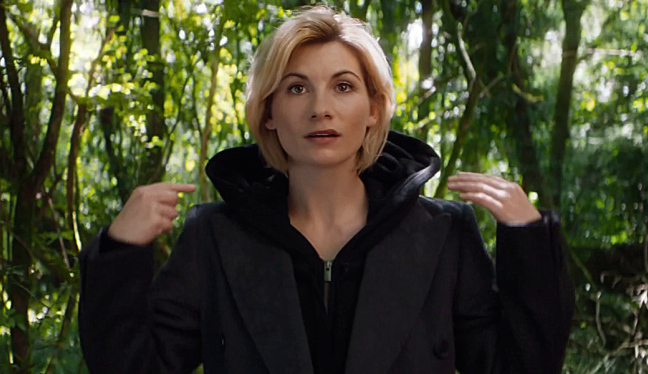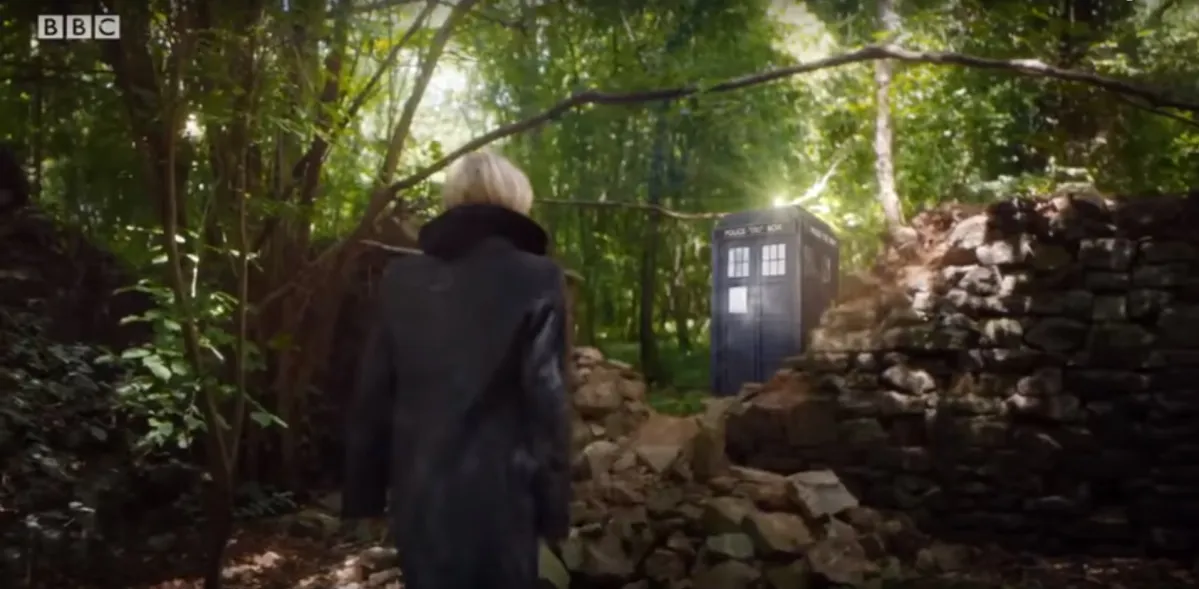When I first saw the trailer announcing Jodie Whittaker as Doctor Who‘s 13th Doctor, I got chills and goosebumps. It felt like something big was happening. Something momentous, not just for this sci-fi show I loved, but for pop culture in general. Hell, for the world. It’s interesting to think that at the beginning of my time as a Whovian, I wouldn’t have felt the same way.
I know we only saw her for, like, a minute, but Jodie Whittaker felt like the Doctor to me. From the hoodie/coat combo, to the look of wonder and awe as she catches a glimpse of the TARDIS, I trust this Doctor. In a one-minute trailer, Whittaker managed to make me feel like I’d follow her anywhere, because while filled with wonder, she also walked with purpose. She was assured, and the bond between her and the TARDIS was clear.
And then, of course, there was the huge thrill of seeing a woman in the role. Part of what gave me goosebumps was knowing that this next Doctor would be experiencing time and space much in the same way I would, for the most part. A woman walking into a room (or onto a space station, or into an alien realm) gets a different reaction than a man doing the same. This is not to say that the Universe is sexist just because we humans are, but especially after millennia of the Doctor wearing a male appearance, if nothing else I’m anticipating a lot of “Huh?” on behalf of the Intergalactic Community as they encounter her for the first time. Because yes, they’re aware that Time Lords in general have been able to change genders and races … but this one—this one that everyone knows—never has before .
And that’s exciting. While that wouldn’t necessarily be a sexist reaction from another species, how it’s handled on the show will allow Doctor Who to deal directly with sexism as we experience it in the real world. That’s what the best sci-fi does—deal with contemporary issues and concerns through the prism of genre tropes.
So, hearing the news this weekend, I was excited, but that forced me to remember that there was a time when, if I was asked about whether I wanted the Doctor to be female, I would’ve said I’d rather he not.

This wasn’t because I didn’t see our desperate need for more female heroes, or because I didn’t want an actress to be able to have the opportunity to play a role this complex and juicy. It was because I saw the Doctor’s maleness as an inherent part of his identity and personality. I would have rather seen Doctor Who focus on a new Time Lady all together. The Doctor didn’t need to be female, I reasoned. The protagonist needs to be. With no prior examples that Time Lords even could change gender, this seemed like the only way we’d get a female lead on Doctor Who.
The Corsair changed everything, but not without complicating things first.
In the Neil Gaiman-penned episode, “The Doctor’s Wife,” we hear of a Time Lord named The Corsair who, over the course of many regenerations has assumed both male and female forms. So then we knew it was possible, and this delighted me. Because while we knew from as far back as Classic Who that Time Lords and Ladies can not only change race and species, but have the ability to choose what form they’ll take as far as that goes, we’ve never actually seen or heard of gender changing before this episode.
So, while later in the sixth season, in the episode “Let’s Kill Hitler,” we see River Song regenerate from a little white girl, to a black teenage girl, to a white older woman, she remains female throughout. The Corsair continued to be the only example of a Time Lord who changed their gender continually.
Which got me wondering: is the Corsair a transgender Time Lord? With the Corsair’s existence seemingly being so anomalous at that point, I wondered if there was a reason for that. Since Time Lords and Ladies seemed to exist on a gender binary, it seemed like the Corsair was an exception to the rule. Then, when anyone would talk to me about the possibility of a female Doctor, I would cite the Corsair and say that I thought a female Doctor would be gimmicky, and that it would take away from the idea of a trans Time Lord.
And then there was Missy.
In Season 8 we finally got our first example of a Time Lord who had consistently been male for as long as the Doctor has been regenerating into a female form. The Master became Missy, and she was awesome. This move definitely felt like prep work for the day when the Doctor himself (themselves?) would regenerate into a female form.
The existence of Missy seemed to confirm that Time Lords and Ladies as a species can change gender. It’s not an anomaly. There are no “trans Time Lords” because the entire species is trans. That’s huge. And that was the thing I needed. All I needed to know is that “Time Lords can do that.” Once I saw that on the show, I was all Sweet! Now the Doctor can be a woman!
What’s disappointing is that, until I had that reason, I was totally hemming and hawing and not thinking about a female Doctor as anything we could, or should have. I did everything I could to rationalize why she couldn’t be female which, looking back at it now, seems like a manifestation of ingrained sexism. The thought that I couldn’t accept a gender change (on a show with fantastical locations and creatures, no less) “just because,” but needed the show to jump through hoops for me to prove how it could be done seems really sad to me.
And it’s not the first time I’ve felt that way, and I’m sure it’s not the first time any women out there reading this have felt something similar. Thinking about it now, when I used to think that a female Doctor would be insulting because it would be “gimmicky,” the real question is, why do I see my own gender as a gimmick? Just because someone may or may not be cynically capitalizing on women’s desire for representation doesn’t mean that women need to receive it cynically.
Just because some might create a female character as a gimmick to financially appeal to changing times doesn’t mean they’re right. Women aren’t gimmicks. We’re half the population of the world. We deserve equal representation everywhere we go, because we’re people. That’s all there is to it. Female Doctor is possibly a gimmick? So the fuck what! We need her. She’s long overdue.
A couple of days ago, I read an article over at GeekDad by Karen Walsh called “I Am Excited, But I Do Not Want a Female Doctor Who.” Calling her a “female Doctor Who” as opposed to the headline reading “I Am Excited, But I Don’t Want a Female Doctor on Doctor Who” really annoyed me, as Doctor Who is not the character’s name. But that aside, Walsh makes the point that, while she herself is totally happy about a female Doctor, she worries that in having the Doctor be female, we’ve taken away a male role model that models brains and kindness over brawn and destruction.
- There are 50+ years of a male version of this hero, and having the Doctor be female now doesn’t erase that. We live in a glorious world in which streaming television and Blu-rays exist. A male Doctor will always be accessible.
- Walsh acts as though the Doctor hasn’t ever caused death and destruction, or been a megalomaniac. I wonder what Doctor she’s been watching? She acts as though it isn’t the majority-female companions who are responsible for acting as the Doctor’s conscience and pulling him back from the edge just as he’s getting too destructive, or full of himself. The smartest thing the Doctor does isn’t solve the Problem-of-the-Week. The smartest thing he does is travel with a companion who will keep him from going too far. Those companions are usually women. We’re now long due for a woman to drive (or be driven by) the TARDIS full time.
- There is a value in seeing an imperfect female Doctor, and as I say above no, the Doctor isn’t perfect, and is often as wrong as they are right. Watching a woman have to grapple with these huge, Universe-altering scenarios would go a long way toward teaching boys and girls not that “women are great!” or “women are heroes!” but that “women are people.” That’s the real lesson all children sadly still need to learn. Sometimes the Doctor is the furthest thing from nurturing. You get to be a couple millennia old, and you suddenly don’t have the patience to coddle and humor the way you used to. If the 13th Doctor stays true to character, it will be fascinating to watch a woman with that kind of complexity.
- It’s just as important for little boys to see women as heroes as it is for little girls. Walsh dismisses this point in her piece, saying, “They already do this if they want to be a caring and intelligent person. Every other emotionally connected, thoughtful character of intelligence in our modern popular culture is a woman.” Perhaps, but they’re not often the heroes—the protagonists—of the stories they serve. They are generally supporting characters playing the nurturing supporting role. Sure, a young boy might find a hero in one of those if, as Walsh says, “they want to be a caring and intelligent person.” But we’re not talking about the boys already predisposed to embracing those traits. We’re talking about all little boys. The ones who won’t necessarily go looking for women to admire, and whom society teaches that women have little to offer besides nurturing and good looks. You don’t reach those little boys by giving them intelligent, emotionally connected supporting female characters. You give them a female protagonist to root for and stand behind.
Walsh, like I used to, seems to be bending over backwards to prove why anything would be better for her son than a female Doctor when the truth is, all of these are just excuses. Every time we base our view of what’s possible for women on the demands and expectations of a patriarchal society, we’re bumping up against the misogyny we are taught.
That’s what the response to the decades-long conversation about a female Doctor and the response to the announcement of Jodie Whittaker as the 13th Doctor have taught me: that sexism isn’t only a problem that needs to be solved by men. Sexism, or rather, the upholding of a sexist society, is something of which we women need to be vigilant within ourselves. The fact that we think of what boys need and what girls need in a role model as two separate things is sexism rearing its ugly head. So was me dismissing a female Doctor because I thought she was a “gimmick” and I didn’t want to get her that way (because the only way I wanted a female protagonist on a long-running sci-fi show was perfectly).
I’m grateful that when I watched the reveal of the new Doctor, I felt nothing but pure joy. I’m excited to meet you, Thirteen! No disclaimers necessary.
(image: screencap/BBC America)
Want more stories like this? Become a subscriber and support the site!
—The Mary Sue has a strict comment policy that forbids, but is not limited to, personal insults toward anyone, hate speech, and trolling.—









Published: Jul 19, 2017 04:35 pm